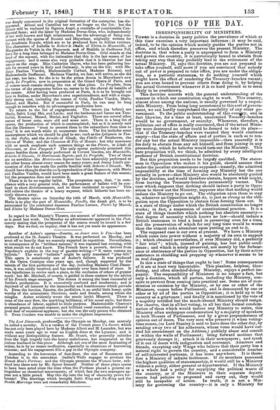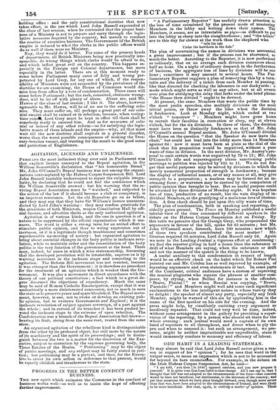TOPICS OF THE DAY.
IRRESPONSIBILITY OF MINISTERS.
Taman is a doctrine coparty politics the prevalence of which at this time exercises a very important influence : it may be said, indeed, to be the opinion which mainly guides the parties not in office, and which therefore preserves the present Ministry. The doctrine is, that when a party is unprepared to form a Ministry and govern the country, it is patriotically bound to abstain from taking any step that may probably lead to the retirement of the actual Ministry. If, says this doctrine, you are not prepared to take office yourself, still more if you are convinced that nobody out of power is prepared to take office, you are under the obliga- tion, as a patriotic statesman, to do nothing yourself which might have the effect of rendering the Treasury-benches vacant; you are even bound to prevent others from doing it, by helping the actual Government whenever it is so hard pressed as to seem likely to be overthrown.
This doctrine accords with the general understanding of the manner in which our constitution ought to work. This country, almost alone among the nations, is usually governed by a respon- sible Ministry. From being long accustomed to this sort of govern- ment, we can hardly comprehend the possibility of any other go- vernment. To the public understanding of this couqkry, and in fact likewise, for a time at least, unoccupied TreasTry-benches would be no government, or anarchy. Whenever, therefore, a politician out of office is really convinced, that if the actual Minis- try were destroyed no other could be formed to take its place— that if the Treasury-benches were vacated they would continue empty—that the state of affairs and of parties is such as to ren- der any but the actual Ministry impossible—then assuredly it is his duty to abstain from any act himself, and from joining in any proceeding, which he believes would turn out the Ministry. This bare proposition will, we think, be admitted by every intelligent professor of British constitutional doctrine. But this proposition needs to be largely qualified. The states- man in Opposition who makes it his guide, should assume that under the peculiar circumstances supposed—namely, the admitted impossibility at the time of forming any Ministry but the one actually in power—that Ministry also would be absolutely guided by the doctrine, and would therefore abstain, happen what might, from leaving the Treasury-benches permanently vacant. The case which supposes that nothing should induce a party in Oppo- sition to throw out the Ministry, supposes also that nothing would induce the Ministry to go out. The obligation upon them to stay in, whatever an Opposition might do, is just as strong as the obli- gation upon the Opposition to abstain from forcing them out. It is a state of things under which the British constitution no longer works; in fact, a suspension of constitutional practice. It is a state of things therefore which nothing but absolute necessity— that degree of necessity which knows no law—should induce a British statesman to lend a hand in preserving even for a time, and the preservation of which for any long time would be worse than the utmost risks attendant upon putting an end to it. The supposed case is our own at present. We have a Ministry which came into power without a majority of its own to support it ; which obtained nevertheless, if ever Ministry did, a perfectly " fair trial"; which, instead of gaining, has lost public confi- dence; and which is solely preserved, not merely by the forbear- ance or abstinence of the parties in Opposition, but by their active assistance in shielding and propping up whenever it seems to be in real danger. Is this a state of things that ought to last Some consequences of it are at least very lamentable. This planless, helpless, blun- dering, and often mischief-doing Ministry, enjoys a perfect im- punity. The responsibility of Ministers is no longer a fact, but only a doctrine, which all parties, including the Ministry, con- spire to prevent from coming into practical use. Some sin of com- mission or omission by the Ministry, or by one or other of the Ministers, comes before Parliament, and is denounced by one or other or by all of the parties in Opposition ; it is held up to the country as a grievance ; and finally it is sanctioned by the vote of a majority terrified lest the much-abused Ministry should resign. For observe, that in all but voting, in all but that formal condem- nation of them which would induce any Ministry to retire, this Ministry often undergoes condemnation by a majority of speakers in both Houses of Parliament, and by a great preponderance of opinion out of doors. The very men who preserve it when voting- time comes, (as Lord Stanley is said to have done the other day, by sending away two of his adherents, whose votes would have car- ried his amendment on the Address,) publicly abuse and assault it within the walls of Parliament; bring forward motions that grievously damage it; attack it in their newspapers ; and speak of it out of doors with indignation and contempt. Admirers and friends, excepting only Whigs who believe that their party has a natural right to govern the country, and a considerable number of self-interested partisans, it has none anywhere. It is there- fore a Ministry of infinite feebleness. If its members possessed the highest qualities of statesmanship, it would still be a Ministry without a policy, either general or departmental. If the Ministry
as a whole had a policy for supplying the political wants of the country, or if the Ministers in their separate depart- ments had policies to propound and carry out, they would still be incapable of action. In truth, it is not a Min- istry for governing the country—it is only a Ministry for holding office : and the only constitutional doctrine that now takes effect, is the one which Lord John Russell expounded at the close of last session, when he contended that the proper busi- ness of a Ministry is not to prepare and carry through the legis- lative measures required by the country, but merely to conduct the routine of executive business. The Government of the British empire is reduced to what the clerks in the public offices would do as well if there were no Ministry.
Nay, they would do it better. For some of the present heads of departments, all British Ministers being now practically irre- sponsible, do wrong things which clerks would be afraid to do, and which inflict great evil on the country. This happens es- pecially in the Foreign and Colonial departments, but more especially in the latter. There are at this moment ready to come before Parliament many cases of folly and wrong per- petrated by Lord Grey, for any one of which, if the respon- sibility of Ministers were not suspended by the prevalence of the doctrine we are examining, the House of Commons would dis- miss him from office by a vote of condemnation. Those cases will come before Parliament ; but the rash, conceited, obstinate wrong- doer, will be let off with plenty of abuse. Abuse me, said Mr. Hawes at the close of last session ; I like it. The abuse, however agreeable to Mr. Hawes, will be of no use to the suffering colo- urs. They must suffer on, till perhaps a great part of our colo- nial empire shall be ruined or in rebellion, because, when voting- time corn. Lord Grey must be kept in office till there shall be somebody ready to succeed him. And as for measures of colo- nial or indeed of any other reform—as for satisfying the legis- lative wants of these islands and the empire—why, all that must wait till the new doctrine shall explode in a general disorder, worse than the worst possible consequences of making the Trea- sury-benches vacant, and trusting for the result to the good sense and patriotism of Englishmen.























 Previous page
Previous page